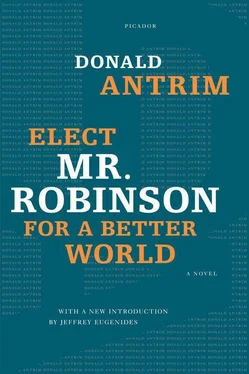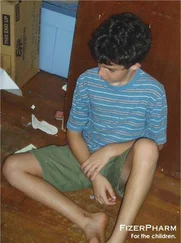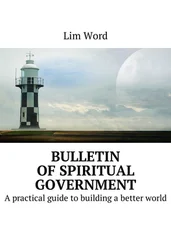Donald Antrim
Elect Mr. Robinson for a Better World
INTRODUCTION BY JEFFREY EUGENIDES. THE BARBARITY OF THE PRESENT
One bright New York day over two decades ago—1990 or thereabouts — in a booth at the Viand Diner, on Second Avenue and Eighty-sixth Street, Donald Antrim handed me the first twenty pages of a manuscript that became, in the fullness of time, Elect Mr. Robinson for a Better World . This was back in the waning days of the typewriter, Antrim’s model, if I remember correctly, being a slim Olivetti whose keystrokes left impressions on those onion-skin sheets as delicate, airy, and stylish as the opening lines: “See a town stucco-pink, fishbelly-white, done up in wisteria and swaying palms and smelling of rotted fruits broken beneath trees: mango, papaya, delicious tangerine; imagine the town rising from coral shoals bleached and cutting upward through bathwater seas: the sunken world of fish. That’s what my wife, Meredith, calls the ocean.” At the time, I didn’t know that this paragraph commenced not only the manuscript I was holding but two others that would follow, comprising what came to be a trilogy of short novels narrated by pedantic, syntactically well-behaved, semi-insane middle-aged men. I had no idea that marine imagery would play such a large role in the novel (later on, Meredith’s self-induced “ichthyomorphic trances” become a barrier in her marriage to the narrator). All I knew was that, following the trajectory of those opening lines, I was suddenly pulled into a never-before-experienced realm: the sunken world of a strange and marvelous book. Elect Mr. Robinson for a Better World is that very rare thing: a book without antecedents. To compare it to other books is to invite frustration: the templates don’t match up. The novel is satirical without becoming satire. It presents recognizable characters in a recognizably American suburb without conforming to realism. It projects psychological disturbance onto the external world without indulging in the gothic. It is a work of the utmost originality and artistic courage and it gets better, and deeper, each time you read it.
The narrator of the novel is Pete Robinson, an unemployed schoolteacher and medieval history buff. As the book opens, Pete is up in his “padlocked attic,” observing his hometown through binoculars. Things don’t look so good. The schools have closed. The ex-mayor, Jim Kunkel, has recently been drawn and quartered in retribution for his having lobbed Stinger missiles into the Botanical Garden reflecting pool, killing former constituents. In addition, town residents have dug spike-embedded “pits” outside their houses to protect themselves from neighbors. Two families are engaging in small-scale warfare in a city park. Meanwhile, “[e]verything, houses and stores, gas stations and banks, all the landmarks of my happy life in this place I love — everything seems to be sinking. How sad things seem then. I half expect to see reptiles emerging openmouthed from bay windows, snakes dripping from aluminum mailboxes and low gratings overhanging two-car garages. It’s a scene from dreams, a watery place familiar but not familiar, home but not home, dredged from within and carrying up intimations of loss, of desire, of my increasingly intense premonition of death by drowning.”
Pete describes the local disarray in the methodical voice of the “Town Scrivener” he happens to be. A running gag in the book involves Pete’s preoccupation with drawing up “lecture notes” in his attic redoubt. (He calls these notes “work God gave [him] to do.”) As readers, we never get to see these notes; what we get, instead, is this book, Pete’s account not only of how wrong things have gone but, more significantly, of what he plans to do to rectify them. Reviewing the events leading up to the mayor’s execution, Pete says: “I’d given a talk, only days before, on an array of such devices, at a Rotary lunch. My intention was to draw parallels between ancient and modern concepts of punishment and guilt, and to demonstrate a few ways contemporary society has internalized, even institutionalized ‘The Barbarity of the Past,’ which was the title of my talk.” Pete’s motives, as he understands them, are commendable; he wishes to enlighten, to instruct. But something always gets in the way. His lecture, for instance, serves only to get him nicknamed “Mr. Executioner” by the townsmen who seek his assistance in killing the ex-mayor, a request Pete, to his later regret, readily complies with, going so far as to suggest that they use “Toyotas and Subarus, in lieu of horses.” In a dying request, Jim Kunkel asks Pete to dismember his body and scatter its pieces in the manner of Osiris. Pete promises to do this, but instead stores Kunkel’s internal organs in his freezer, managing to bury only a foot, which bleeds onto some fig bars another character mistakenly eats.
Yet, for all this, Pete isn’t deterred. His wanderings through the blighted landscape are accompanied by thoughts of resurrection and renewal. He wants to run for mayor. He toys with campaign slogans: PETE ROBINSON FOR PEACE ON EARTH. PETE ROBINSON, A STEP TOWARD PARADISE. The title of the novel is itself a campaign slogan, and much of Pete’s verbiage has the ring of political rhetoric. He’s constantly explaining, theorizing, bringing history and cultural lore to bear on the immediate situation. Pete knows a lot of stuff — about The Egyptian Book of the Dead, Portuguese torture chambers, elementary school pedagogy — but nothing that he knows helps him understand his world. The sense that knowledge itself — history, the Western canon, you name it — is falling into ruin just as surely as the town pervades the novel, and since this, too, is a book, something of that decay gets imparted on your hands as you read.
Pete’s dreams of becoming mayor, like his hopes of opening a school in his home, exist in opposition to the decadence of the municipal, political, and educational systems. The taxpayers have defunded the schools. The former schoolhouse has been turned into a factory for the manufacture of talismans made from coral. Pete’s wife, Meredith, gives him one of these trinkets, signifying her membership in the growing fish cults. This seaside Florida town, in an unspecified location, in an unspecified year, has receded into a primitive condition where superstitions flourish and citizens understand themselves to be inhabited by invisible forces. The book’s narrative strategy perfectly suits this, for Pete’s own loquacity, his veneer of rationality, is a shell for dark forces within. Just why is he so interested in the Inquisition, anyway? Why, in his basement, is Pete building a “1:32-scale, exhibition-quality balsa-and-Styrofoam cutaway reproduction of a Portuguese interrogation chamber (circa 1600), complete with rack, miniature shackles fashioned from spray-painted costume-jewelry chokers and clasps, and Q-tips representing albino rats”? Though Pete considers himself the possible savior of the town, the fact that he wants to be mayor links him to the former officeholder, the deadly Kunkel. What mayoral duties does Pete, in his heart of hearts, want to assume? Who is he really?
Since the publication of Elect Mr. Robinson, dystopic fiction has become something of a fad. Antrim was there early, if not first. Certainly today, in the wake of 9/11 and the appearance of border militias, right-to-carry laws, and survivalist bunkers, this novel seems even more prescient than it did when it came out in 1993. But “dystopic” describes neither the madness nor the method here. The heart of Antrim’s enterprise, the thing that allows him to make credible his wild surmises, is his keen insight into social and marital relations and his masterful linguistic skills.
Читать дальше












